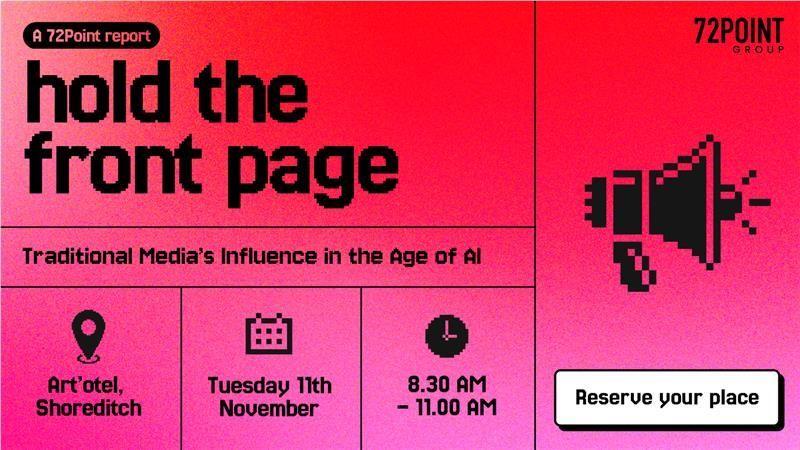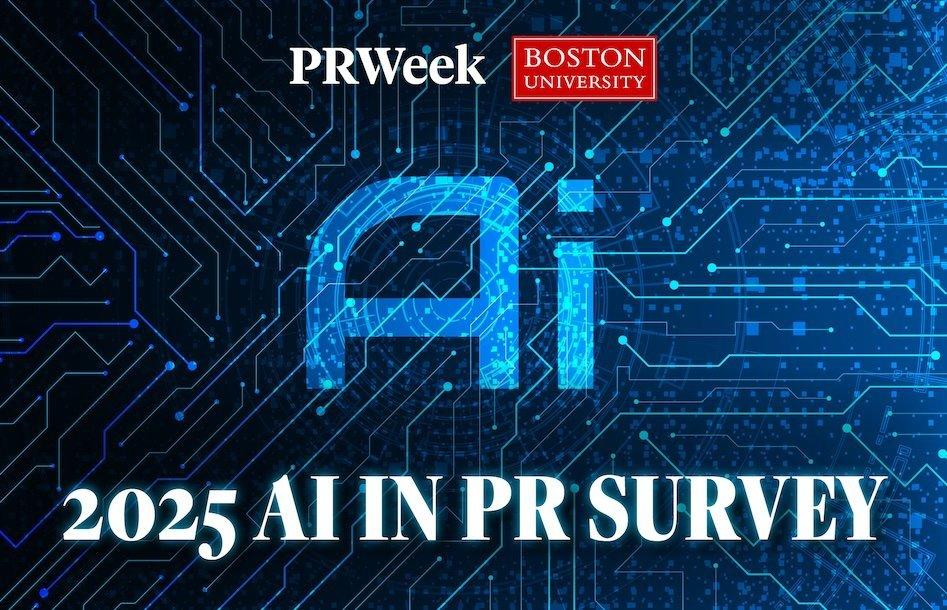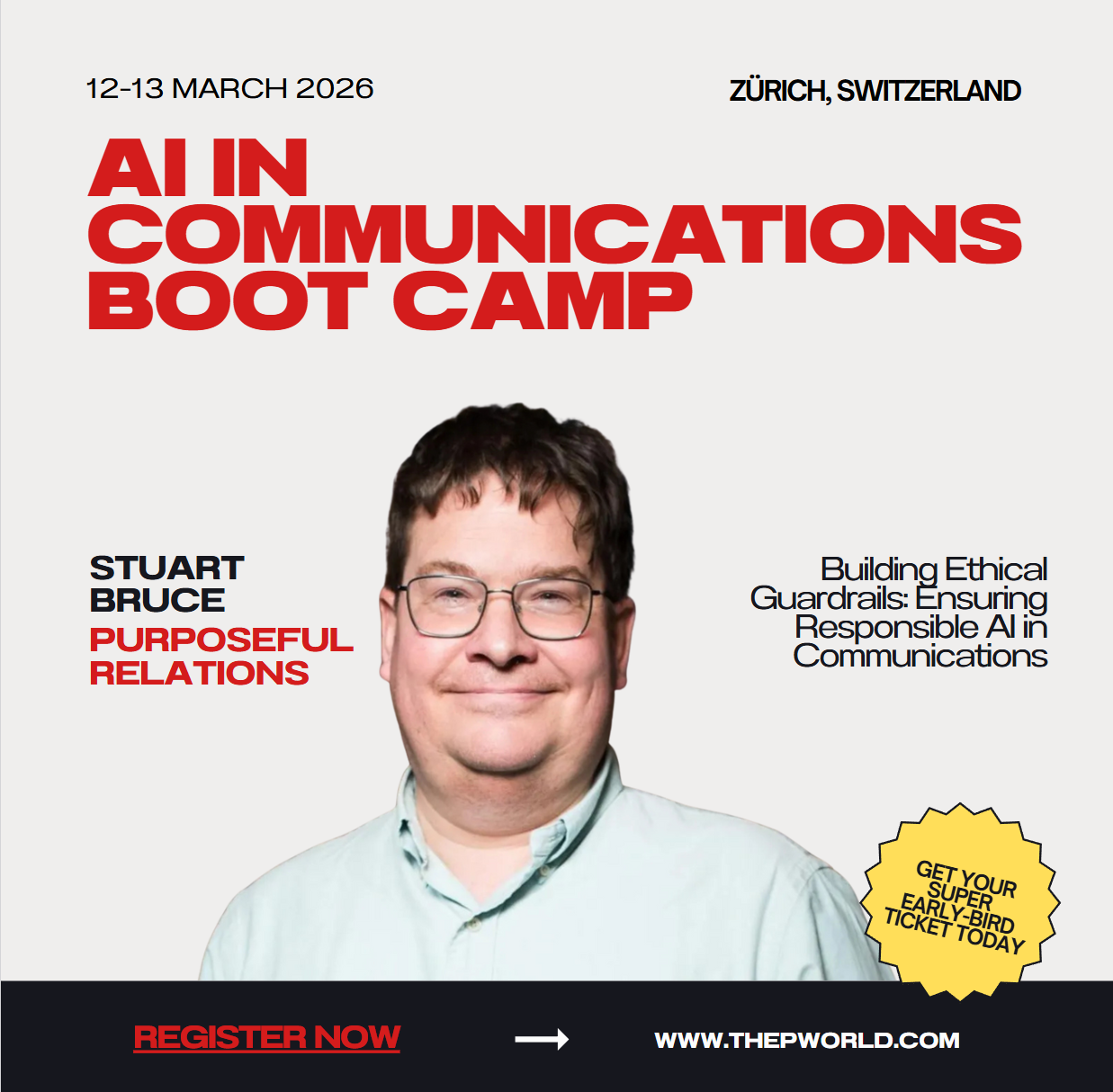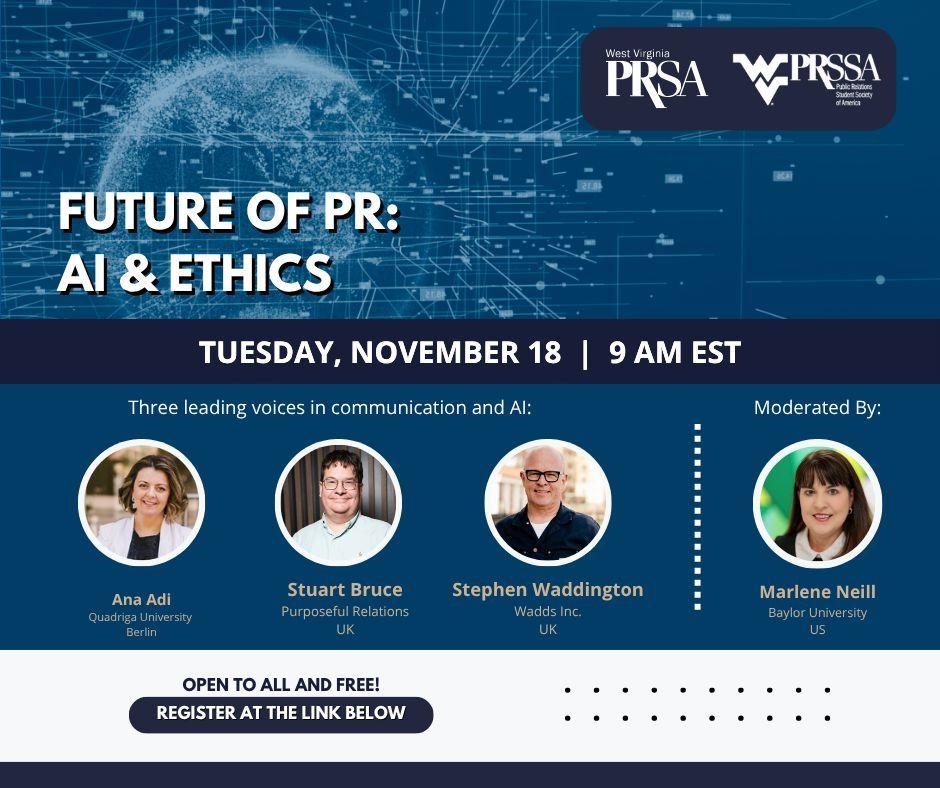 Welcome
Welcome

We've missed you. The unplanned gap in production of PR Futurist is down to a combination of illness (me!) and lots of client work taking priority. We've also been working on a special research project with the 72Point Group (client) and you'll get first look if you sign up for our exclusive senior leadership briefing on GEO's impact on PR, comms and the media. GEO is all about influencing AI and is a must‑know for professional communicators in 2025.
In this issue we look at Taylor Swift's use of AI (or not!) and Deloitte’s stumble in Australia, where consultants leaned too heavily on generative AI and ended up refunding the government. PRWeek’s much‑touted AI survey, meanwhile, exposes the same old gap between ambition and action and overturns a generational myth about AI.
We also see how the governor of the Bank of England is using Copilot to sharpen speeches and case studies of how a Goldman Sachs banker uses AI to spend more time with people and how the CEO of Australia's largest law firm has revolutionised her work.
You'll find several links to other things I've been up to including PRCA webinars and podcasts (not just on AI!) and an AI bootcamp in Zurich.
There are also lots of stories and hard research highlighting the critical importance of social licence for AI. You're in trouble if this isn't in your agenda for 2026.
 News
News

Senior leader briefing on GEO's impact on PR, comms and the media
Join us as we cut through the hype and examine GEO's real impact on PR, communications and the media. In partnership with the 72Point Group we'll be releasing an exclusive two part research report with actionable insights that comms leaders need to be acting on.
Our expert panel is made up of:
- Antony Cousins, VP at Meltwater and one of the leading thinkers on the intersection of PR and AI.
- Karyn Fleeting, delivery director at Reach plc who will provide an exclusive publisher perspective on AI's impact.
- Darryl Sparey, MD of Hard Numbers , known for his passion for data and the driving force behind one of the PR industry's first research reports into GEO.
- Stuart Bruce, yours truly, co-founder of Purposeful Relations and co-author of a new PR and corporate comms GEO report we'll be unveiling on the day.
Places are limited so please register ASAP.

PRWeek and Boston University AI in PR survey
PRWeek has published its "inaugural AI survey" which it claims provides "the biggest insights into AI's use in PR yet produced". Produced in partnership with Boston University the results are depressingly familiar: enthusiasm for innovation, but little evidence of effective implementation.
Yet again we see the unsurprising but still worrying gap between aspiration and reality. The main barrier is a lack of expertise which results in confusion and a lack of meaningful progress. It's critical to overcome the AI adoption illusion. Simply providing AI tools doesn't lead to transformation and benefits.
One positive finding is that it confirms an argument I've been making for some time that the gap between generations isn't as big as some think it is. It's wrong to make the assumption that 'Gen Z' or 'Millennials' will be more AI astute or ready. In fact Millennials show the highest anxiety, with 24% believing peers use AI extensively. This shows the pressure on them to 'know AI', when they really don't.
Despite its grandiose claims it appears the survey was mainly US focused.
I've done a deeper analysis on my PR Futurist blog.

Speaking about AI and ethics at the AI in Communications Boot Camp in Zurich
I'm excited to be speaking at AI in Communications Boot Camp in Zurich, March 12–13 next year. Why not join us for two days of "no-fluff, practical insights from the brands already leading the AI transformation in communications"?
I'll be speaking about 'Building Ethical Guardrails: Ensuring Responsible AI in Communications'
As AI becomes embedded in the daily work of communicators, the ethical stakes have never been higher. How do we embrace innovation without compromising transparency, accountability, or trust? My session will explore the frameworks and guardrails organisations must build to ensure AI is used responsibly in storytelling, stakeholder engagement, and reputation management. From tackling bias and misinformation to safeguarding data integrity, you’ll learn how to balance speed and scale with values and ethics. The goal is to help communicators lead the conversation on responsible AI adoption—protecting both their organisations and the public they serve.
Speakers are: Kelly A. Nantel, Amazon; Stuart Bruce, Purposeful Relations; Jorunn Aamodt, IKEA; Megan Ronaldson, ABB; Richard Tigges, AUDI AG; Simon Jenkins, Spotify; David Mills, Mondeléz International; Oliver Hayes OBE, Edelman; Peter Heneghan and Nathaniel Davies, Roche.

PRSA webinar on the future of PR - AI and ethics
I'll be speaking on a PRSA panel looking at the future of PR, AI and ethics. It's on Tuesday 18 November at 2pm (UK time) which is 9am on the east coast of the USA. I'm looking forward to being on a panel with Ana Adi from Quadriga University in Berlin and Stephen Waddington of Wadds Inc.

AI in comms and marketing webinar
If you missed my recent LinkedIn Live with Madeleine Weightman and Ben Mitchell of The Work Crowd you can still watch it or read a summary of the discussion. DD

PRCA podcast on improving the representation of women at the top of the PR profession
I volunteer on the steering group of the Break the Silence Collective and recently did a podcast with fellow steering group member Shayoni Lynn for the PRCA's Sparks podcast as part of the Equity and Inclusion Advisory Board (EIAB) series with guest host Mark Wainwright.
The wide range discussion explores everything from why women remain underrepresented at the top of the profession, to highlighting solutions that can make PR a fairer and more inclusive industry. The conversation tackles uncomfortable truths while also offering a vision for meaningful change.
AI’s impact on in-house communications
Read my interview for The Work Crowd all about the impact of AI on in-house communications and corporate affairs professionals.
 AI
AI
Deloitte to refund Australian government after using AI to write an error-ridden report
After errors were found in a report written for the Australian government Deloitte admitted its consultants had used generative AI to help produce it. Deloitte was forced to repay the final instalment under its contract.
Deloitte shouldn't be "admitting" to using AI as using AI a good thing. It would have been a bigger sin or omission by Deloitte if it hadn't used AI.
Deloitte should be confessing to the fact its consultants didn't know how to use AI effectively and instead of using AI to help them write a better report faster they used AI to write parts of the report without proper human oversight. They should have used AI as an assistant to speed up the process and produce a better report.
The Guardian also reported the story.
What's alarming is that Deloitte claims to be able to advise its clients on AI adoption.
This little/big setback with using AI hasn't deterred Deloitte from signing a huge deal with Anthropic to use its enterprise AI system to roll out its Claude AI chatbot to all 500,000 employees around the world.
Taylor Swift fans accuse her of using AI in videos to promote her latest album
You don't have to be a Swiftie to have seen the controversy about Taylor Swift's scavenger hunt. To promote her 12th album, 'The Life of a Showgirl', fans had to search Google to unlock 12 physical locations marked by orange doors and QR codes. However, fans were quick to speculate the 12 videos might be AI generated. Neither Google or Swift's team have confirmed either way.
The controversy is that Taylor has previously been outspoken about the use of AI. It does highlight that regardless of if AI is used or not that people might think it is.
NHS launches Communications Artificial Intelligence Operating Framework
The NHS Confederation has published a framework for the use of generative AI in communications.
 Get in touch
Get in touch

How well are you planning for AI?
As you're working on budgets for 2026 why not have a quick chat with Purposeful Relations to see how we can help you can benefit from the opportunities of AI and minimise the risks.
We can help with:
- Planning, choosing, integrating, developing and training to ensure successful AI adoption in your team.
- Advising on social licence for AI to win trust from all stakeholders including employees, customers and regulators.
- GEO to influence the answers of AI models to protect your reputation and brand.
- Advice on how to manage the strategic reputational implications of AI for your organisation.
Our custom CommsTransform™ process, built on our many years' experience, implements effective change to improve the performance of PR, communications and corporate affairs teams.
Book a free no obligations chat with Stuart Bruce to explain your challenges to see if we can help.
Karen Marshall
 CommTech tools
CommTech tools

Microsoft improves Copilot for PR and comms professionals
Microsoft has announced a number of improvements and enhancements to Copilot that will benefit PR, communications and corporate affairs professionals.
Copilot agents introduce ‘vibe working’ to make them even more powerful assistants.
Copilot Connectors enable you to use its AI to access information on additional personal and third-party accounts.
Document creation supports creating and exporting content into multiple file formats with a simple prompt. Users can generate Word documents, Excel spreadsheets, PDFs, or PowerPoint presentations and more directly from their Copilot session.
Anthropic AI models added to Microsoft 365 Copilot to enable the use of Claude AI as well as ChatGPT.
 Case studies
Case studies

Is that your MP speaking, or a robot? The shocking truth revealed.
The latest shocking news is some MPs appear to be using AI to help write their speeches for the House of Commons. Frankly, I’d be more shocked if they weren’t. The MPs we should be alarmed about are those who aren’t equipping themselves with the basic skills of the AI age. How can we trust them to regulate AI if they aren't even capable of using it and understanding it?
It’s not just MPs who are using AI to help write speeches as The Times has revealed that Andrew Bailey, the governor of the Bank of England, uses AI to help shorten and sharpen his speeches. The Bank of England has confirmed that Bailey uses Microsoft Copilot to help draft official speeches. The Times reports that Bailey uses Copilot as an editing tool, inputting the draft of a lengthy speech and asking the software to cut it down to the right length before delivering it.
The fact he uses Copilot is important as it means he maintains privacy and data security on the Bank of England's enterprise licence with Microsoft. It would be dangerous to do the same using a personal AI tool.
In this longer read article on my PR Futurist blog I take a look at what PR and corporate comms can learn from this.
The image was generated using Google Gemini’s new Nano Banana (where do they get these idiotic names?).
Goldman Sachs partner uses AI to spend more time with people
Some interesting lines in this FT interview with a Goldman Sachs banker. She says: “We’re still in the early stages of incorporating the technology into our day-to-day tasks, and I am finding new ways to use it every day. It can be hard to quantify since it isn’t just about saving time but also about enhancing the work. But at this point, I’d say it saves me a few hours per week.”
She cites four ways she uses AI: getting quick answers to complex technical questions; summarising the key points within dense documents; editing and polishing her own written work; and brainstorming.
She adds that time saved can be spent with colleagues and clients.
World's first AI minister takes office in Albania
Albania is an unsung technology hero so it's not too surprising it has become the first country in the world to have an AI minister — that's an actual AI minister powered by AI, not just a minister for AI.

Oxford becomes first UK university to offer ChatGPT to all staff and students
Coincidentally on the same day Oxford university announced it was offering ChatGPT to all its staff and students I had one of Oxford university's communication team on my communications measurement and evaluation training course. The headline isn't strictly accurate as although staff and students are all being given free access to ChatGPT Edu (with its associated security and privacy benefits) they are also being offered Microsoft 365 Copilot and Google Gemini, although departments have to buy their own licences if they want more than just the free Copilot Chat included in Microsoft 365 licences.

MinterEllison CEO Virginia Briggs uses M365 Copilot for every task, every day - Source Asia
Virginia Briggs, the CEO of MinterEllison, Australia's largest law firm, shares how she uses Microsoft 365 Copilot and Researcher agent to streamline research, meetings, and strategic communication; transforming how legal leadership works.
 Research and reports
Research and reports

Twice as many Britons view AI more as an economic risk than opportunity
The Toby Blair Institute for Global Change has published a report on 'What the UK Thinks About AI: Building Public Trust to Accelerate Adoption'. It provides yet more evidence about the need for communications leaders to urgently understand the importance of social licence for AI. The poll of more than 3,700 adults also showed that lack of trust was the biggest barrier to adoption.
UK adults are more inclined to view AI as a risk for the economy (39 per cent) than an opportunity (20 per cent), according to a new poll conducted by the Tony Blair Institute for Global Change (TBI) and Ipsos. Moreover, 38 per cent of respondents in the same survey cite lack of trust in AI as a barrier to adoption.
Across the UK, people’s perceptions of whether AI is more of a risk or an opportunity to them personally are finely balanced. For example, 29 per cent of 45- to 54-year-olds viewed AI mainly as a risk and 27 per cent mainly as an opportunity.
There is a clear correlation between people’s confidence in using AI and their attitudes towards the technology. Of people confident in their AI skills, 66 per cent expect AI to help with parts of their job while leaving their core responsibilities intact. In contrast, only 45 per cent of people with lower confidence in their skills view AI as a supportive tool.
UK workers wary of AI
If you want even more evidence about why I'm constantly emphasising the importance of social licence for AI then read this research by The Guardian and Ipsos. A third of those polled do not tell bosses about use of tools and half think AI threatens the social structure. The number of people believing it has a positive effect is outweighed by those who think it does not. Only 13% openly discuss AI use with senior staff. A quarter fear colleagues would question their competence if they admitted relying on AI. A third of UK workers don’t tell bosses they use AI tools.
The Guardian says the polling appears to reflect workers uncertainty about how bosses want AI tools to be used, with many employers not offering clear guidance. There is also fear of stigma among colleagues if workers are seen to rely too heavily on the bots."
This is why it's critical to have AI policies in place and to provide training and support before imposing AI into the workplace.
Why behavioural science matters in an AI world
BIT is a private company that was spun out of the UK government's Behavioural Insights Team. It is publishing a series of reports on why behavioural science matters in an AI world. The reports focus on the fact that AI isn't just technology but is primarily about human behaviour.
That's why cultural change is the focus of much of our consultancy and training for clients to help ensure AI adoption. Yes, we help with choosing, integrating and developing the right technology but the AI adoption illusion is build it and they will come.

AI in In-House Communications Report 2025
I was recently asked to contribute to another new report on AI and in-house communications. This time for The Work Crowd where a summary was shared in PRWeek's new InHouse title for in-house communications professionals. You can download your copy here.
Chief communications officers are absorbing more corporate functions, new report
A new report by the Observatory on Corporate Reputation (OCR) reveals chief communications officers are absorbing more corporate functions.
Sort of. Read beyond the headline and you'll see most of those functions have already been within their remit for ever. It's just that there isn't an agreed umbrella term or name for their 'remit'. Corporate affairs, brand, investor relations and public affairs have always part of the same broad function. Elements of marketing, human resources and ESG have always overlapped.
Technically I'd place them all as part of the strategic public relations function because it looks after reputations and relationships, which these are all part of. However, even if technically correct the term public relations isn't understood beyond the profession (or even within the profession!) so lots of people mistakenly think it's media relations or earned media.
Corporate affairs is my preferred umbrella term as I can't use the correct one of public relations.
Marketing and human resources are distinct disciplines in themselves. The 'Sustainability/ESG/Impact' and DEI ones make no sense whatsoever. They are all ESG. The E for environmental covers sustainability. The S for society and G for governance cover DEI.
The confusion around these areas is they can use the same tools, tactics and channels. They can all use paid media or advertising. They can all use media relations.
It's a mistake to confuse the tools and tactics with the purpose.
